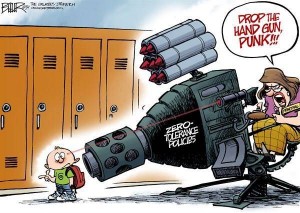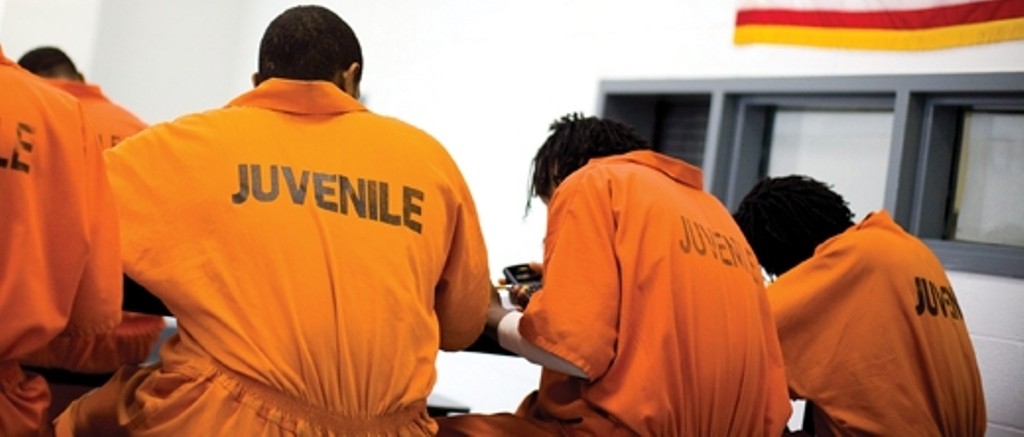The school-to-prison pipeline stands in direct opposition to the American ideal of liberty and freedom for all. This problem in our society disproportionately affects certain social groups – it often compounds the problems of social groups that already have the odds stacked against them in our patriarchal society where white men, like myself, are inherently granted power.
Despite the backwardness of what seems to be occurring, the pipeline remains an active part of the United States, and our school system. Misbehaving students get kicked out of schools. Last year, in Chicago, a silly gun gesture from a sixth grader to a teacher received an immense overreaction and ended up with the student getting arrested.24

This occurred after many suspensions in response to previous misbehavior from the student. It seems to me that if the student was not having any more success after each suspension, then it should have been obvious to the administration that something other than exclusionary discipline needed to be done. Students everywhere are disciplined, and often suspended for minor infractions. Stories such as these show the dangers and the wrongness of zero tolerance policies and exclusionary discipline.
Fortunately, steps can be taken to plug and reverse this pipeline and stop students from being enabled and forced to proceed down this negative path. This has been an uplifting thought as I’ve researched the school-to-prison pipeline and the organizations that are acting against it. For people are recognizing the obvious aspects of schooling that cause problems. We must put an end to zero tolerance policies. We have to be careful about high stakes testing. We have got to understand which students are being disproportionately incarcerated and why these students in particular are having these problems. This is a lot to change, and it may seem overwhelming, but it is not. There are solid, concrete suggestions being provided by experts that we ought to follow. We must understand students and their backgrounds and their problems that may be causing them to misbehave in class. We should try to cultivate relationships between students and teachers. We should encouragement youth engagement in fighting against the pipeline and thus get students more excited about school. We should show students who are at risk of entering the pipeline the benefits of higher education rather than shunning them from the classroom. We should recruit more teachers of color. We should prepare teachers to teach students of all backgrounds.
By installing these new approaches of educating, we will put ourselves on a new, more constructive pathway towards the success of all social groups and away from incarceration of our nation’s youth. The research that has been done on the topic seems to be extremely promising. And yet, the pipeline itself is still extremely prevalent. While the research and methodology seems to be available, it is not being put into practice enough. The suggestions are there, but the application of said suggestions is not.
Why are these steps not being taken? While the fact that possibilities outside of the pipeline do exist is uplifting, the fact that they have not become major factors in teaching is extremely depressing. We can, help, so why aren’t we? What I’ve realized from my research is that while the education system may not be changing from the outside in, change is coming, just from the outside in. This is where grassroots organizing comes into play. I’ve used “we” in this writing because it has been the biggest takeaway for me after doing this work. A movement away from the pipeline will have to be a movement that starts with us, the people, the public. We are the ones that will make this difference. This sounds like a communist, rallying cry, but I believe that it actually does carry legitimacy. Grassroots organizing has contributed a lot to the destruction of the school-to-prison pipeline. With youth, parent, and community engagement, organizers across the country, in Texas, Colorado, and California just to name a few of the places, have helped in the decline of zero tolerance policies and have promoted more focus on children who have not been given a chance to succeed. These people care about their communities and they show it by instilling practices including restorative justice, training for security guards, and promoting values such as equal rights and economic justice.
Education is a personal endeavor. The people who care about an individual’s education are the same people that care about that person and their success in the world. This is why grassroots organizing works so well, not only in combating the school-to-prison pipeline, but in urban education in general. These close knit, geographically central communities can evoke change in ways that other groups cannot. And they have shown it. I think that future change lies, at least partially, in a focus on grassroots organizations and their efforts. We can only help by continuing to support grassroots organizers and helping when we can to actively change urban education for the better. By doing this we can secure more benevolent, equitable, and secure lives for future generations that will receive urban, public school educations.

Imgs:
23
24
